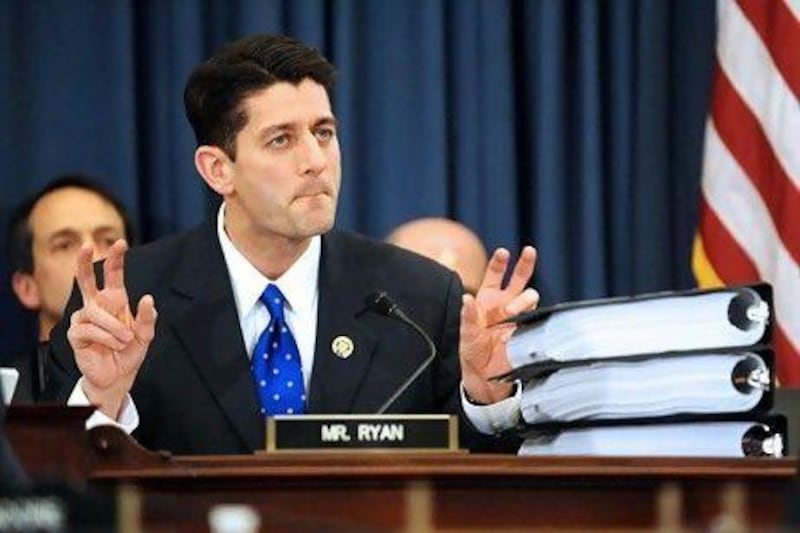NORFOLK, Virginia // By choosing wonkish budget hawk Paul Ryan as his running mate, White House hopeful Mitt Romney is gambling that voters want nothing less than a showdown over the nation's fiscal future and the role of government in American life.
Bucking conventional wisdom that Romney would opt for safety over risk, for wooing independent voters over firing up the base, the Republican flagbearer has chosen a conservative hero who is a lightning rod for controversy.
Ryan, the serious and impassioned yet even-tempered fiscal pitbull who has emerged as a star in the House of Representatives' Republican caucus who have embraced his plan to slash spending, became the clear choice for many influential conservatives seeking a bold running mate for Romney.
They got it in Ryan, a seven-term congressman from the Midwestern state of Wisconsin.
While a clear Washington insider who at age 42 has already worked on Capitol Hill nearly half his life, the House Budget Committee chairman is pledging a revolutionary, once-a-generation debate about the direction of the economy.
"We are offering the nation a better way forward," Ryan said in March shortly before the House approved his budget proposal by 228 votes to 191, with all Democrats and 10 Republicans opposed.
The budget, Ryan said, shows "how we plan to save this country from a future of debt, doubt and decline."
While the budget, which would cut spending by some $5 trillion over the next decade, has no chance of passing the Democrat-held Senate, it frames the Republican position on spending and debt reduction and puts pressure on Democrats over tax and spending issues.
And yet the plan that Romney has now come to own with his Ryan pick is fraught with political dynamite. President Barack Obama and his Democrats have demonized the plan as giving tax breaks to millionaires while gutting much-needed federal programs and placing excessive financial pressures on middle-class Americans.
It also includes a plan to semi-privatize Medicare, the government health insurance program.
Many conservatives were pressing for such an explosive pick, someone who would not shy away from engaging in monumental debates.
"Mr. Romney's best chance for victory is to make this a big election over big issues," the conservative-leaning Wall Street Journal said in an editorial earlier this month.
"Against the advice of every Beltway bedwetter, (Ryan) has put entitlement reform at the center of the public agenda -- before it becomes a crisis that requires savage cuts," it said, adding that Ryan "best exemplifies the nature and stakes of this election."
Ryan was born and raised in Janesville, in Wisconsin's southeast corner where he still lives with his wife and three children. His family put down roots there four generations ago.
His father died when he was in high school, and the loss turned the young Ryan into an introspective, serious student who held odd jobs, joined the Latin and history clubs in school and pored over books by conservative icon Ayn Rand.
"I grew up really fast," he said in a recent New Yorker magazine profile.
In the early 1990s he worked for a Wisconsin senator, then as a speech writer for revered Republican Jack Kemp, who himself was the vice presidential candidate in 1996.
In 1998, at age 28, Ryan was elected to Congress, and rose quickly in the Republican ranks. By 2004, he set about trying to privatize Social Security, the government safety net for retirees, and while his bid stalled, it presaged the caustic debates over entitlement programs that were to follow.
While Ryan is beloved by core conservatives, and his being on the ticket helps assuage their suspicions about Romney and his policy reversals on issues like abortion and gay rights, some experts wonder whether Romney is courting the right voters in an election many say will go down to the wire in November.
"Romney's got to focus on winning over the swing voters in key states, and I don't think Paul Ryan will help in any way," said politics professor Alan Abramowitz of Emory University.
There is also concern that picking Ryan plucks him out of the House, where he has enjoyed vast influence molding the Republican agenda, and would place him in a Romney White House where he'd have to fall in line with his boss's pragmatism rather than focus on his own sweeping fiscal plans.






